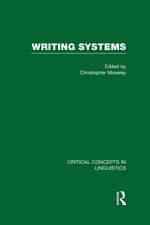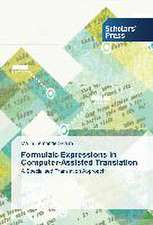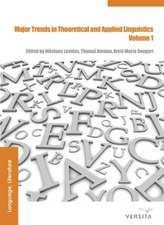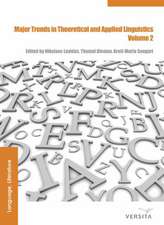The Agency of Organizing: Perspectives and Case Studies
Editat de Boris H. J. M. Brummansen Limba Engleză Hardback – 14 sep 2017
The Agency of Organizing explains why the notion of agency is central to understanding what organizations are, how they come into existence, continue to exist, or fade away, and how they function. Written by leading organizational communication scholars, the chapters in this edited volume present seven different theoretical perspectives on agency in the dynamics of organizing. Authors discuss how they conceptualize agency from their own perspective and how they propose to investigate agency empirically in processes of organizing by using specific methods. Through insightful case studies, they demonstrate the value of these perspectives for organizational research and practice.
| Toate formatele și edițiile | Preț | Express |
|---|---|---|
| Paperback (1) | 340.60 lei 22-36 zile | +19.15 lei 6-12 zile |
| Taylor & Francis – 19 sep 2017 | 340.60 lei 22-36 zile | +19.15 lei 6-12 zile |
| Hardback (1) | 1042.98 lei 43-57 zile | |
| Taylor & Francis – 14 sep 2017 | 1042.98 lei 43-57 zile |
Preț: 1042.98 lei
Preț vechi: 1404.46 lei
-26% Nou
Puncte Express: 1564
Preț estimativ în valută:
199.58€ • 208.90$ • 166.11£
199.58€ • 208.90$ • 166.11£
Carte tipărită la comandă
Livrare economică 31 martie-14 aprilie
Preluare comenzi: 021 569.72.76
Specificații
ISBN-13: 9781138655201
ISBN-10: 1138655201
Pagini: 256
Dimensiuni: 152 x 229 mm
Greutate: 0.48 kg
Ediția:1
Editura: Taylor & Francis
Colecția Routledge
Locul publicării:Oxford, United Kingdom
ISBN-10: 1138655201
Pagini: 256
Dimensiuni: 152 x 229 mm
Greutate: 0.48 kg
Ediția:1
Editura: Taylor & Francis
Colecția Routledge
Locul publicării:Oxford, United Kingdom
Public țintă
UndergraduateCuprins
List of Illustrations
Foreword: Theorizing Agency by Making the Implicit Explicit
Linda L. Putnam
Acknowledgments
1. Introduction: Perspectives on the Agency of Organizing
Boris H. J. M. Brummans
2. The Distribution of Decision Rights at ICANN: A Luhmannian Perspective on Agency
Steffen Blaschke
3. Being Able to Act Otherwise: The Role of Agency in the Four Flows at 2-1-1 and Beyond
Joel O. Iverson, Robert D. McPhee, and Cade W. Spaulding
4. Agency in Structurational Divergence and Convergence: Insights from Nursing
Anne M. Nicotera
5. Targeting Alex: Brand as Agent in Communicative Capitalism
Dennis K. Mumby
6. Releasing/Translating Agency: A Postcolonial Disruption of the Master’s Voice among Liberian Market Women
Kirsten J. Broadfoot, Debashish Munshi, and Joëlle Cruz
7. Acting For, With, and Through: A Relational Perspective on Agency in MSF’s Organizing
François Cooren
8. Agential Encounters: Performativity and Affect Meet Communication in the Bathroom
Karen Lee Ashcraft and Timothy R. Kuhn
9. Conclusion: Further Theoretical and Practical Reflections on Agency
George Cheney and Dean Ritz
About the Contributors
Index
Notă biografică
Boris H. J. M. Brummans (PhD, Texas A&M University) is a Professor in the Département de Communication at the Université de Montréal in Canada. His research interests include agency, mindful organizing, organizational communication, organizational ethnography, and process philosophy. He has contributed chapters to several edited books and his articles appear in international peer-reviewed journals such as Communication Monographs, Human Relations, Information, Communication & Society, Management Communication Quarterly, Organization Studies, and Qualitative Inquiry. His edited volume, The Agency of Organizing: Perspectives and Case Studies, received the 2018 Outstanding Edited Book Award from the Organizational Communication Division of the National Communication Association and he served as an Associate Editor of Management Communication Quarterly from 2015 to 2019. He also received college and university awards for his teaching excellence and was a Visiting Scholar at Seinan Gakuin University in Japan as well as the University of Bologna in Italy.
Recenzii
"This book presents an exciting and diverse set of approaches to agency. If we understand agency as ‘making a difference’ in the way situations unfold, this volume will certainly have agency in stimulating and shaping new lines of research in the field of organizational communication."
-Lars Thøger Christensen, Professor of Communication and Organization, Department of Management, Society and Communication, Copenhagen Business School
"This is a wonderfully edited volume of thought-provoking essays on the topic of agency in and around organizations. For some time, some of the best theorizing in organization studies has in my view been coming from the organizational communication field, and here once again the leading figures in this tradition unpack, challenge, critique, and extend established notions of agency and agency theory within management and organizational research. They push and refine our thinking on agency in many ways. If you have an interest in understanding organizations and organizational life, you simply must read this collection!"
-Joep Cornelissen, Professor of Corporate Communication and Management, Erasmus University and Associate Editor, Academy of Management Review
"Do we make our own future or are we pawns set in motion by forces we cannot control? This is an age-old question to be sure. Many of the most popular theoretical perspectives that have emerged over the past several decades to confront it have suggested that the answer is, 'both.' Clearly, that is not a very satisfactory answer. The contributors to this book dive deep into discussions of agency to begin mapping out new ways to understand our capacity to act – which often happens in conjunction with a network of other actors. Together, these insightful chapters provide us new ways to understand these old questions in an era of rapid change."
-Paul Leonardi, Duca Family Professor of Technology Management, University of California, Santa Barbara
"After reading this text, I came away impressed with the treatment of agency in all of its performative, material, constrained, individual, and collective aspects. Although the contributors are all organizational communication scholars, any organizational scientist interested in pushing the boundaries of what agency means for organizations and its members should find this book to be a valuable resource."
-Gail T. Fairhurst, Distinguished University Research Professor of Organizational Communication, University of Cincinnati
"Agency, seen in terms of this volume, helps us see how the context-bound present moment becomes real in the organization. The illustrations here allow us to envision how seeing agency differently can open up new ways of understanding the organization and its consequences."
-James R. Barker, Professor of Organizational Theory and Strategy and Herbert S. Lamb Chair in Business Education, Dalhousie University
"Theorizing is a risky business; creativity and courage are needed. The chapters in Professor Boris H. J. M. Brummans’s edited volume exhibit both at full tilt. I recommend the book for the advanced and serious student of organizational communication and organization studies."
-Ryan S. Bisel, Professor of Organizational Communication, University of Oklahoma
-Lars Thøger Christensen, Professor of Communication and Organization, Department of Management, Society and Communication, Copenhagen Business School
"This is a wonderfully edited volume of thought-provoking essays on the topic of agency in and around organizations. For some time, some of the best theorizing in organization studies has in my view been coming from the organizational communication field, and here once again the leading figures in this tradition unpack, challenge, critique, and extend established notions of agency and agency theory within management and organizational research. They push and refine our thinking on agency in many ways. If you have an interest in understanding organizations and organizational life, you simply must read this collection!"
-Joep Cornelissen, Professor of Corporate Communication and Management, Erasmus University and Associate Editor, Academy of Management Review
"Do we make our own future or are we pawns set in motion by forces we cannot control? This is an age-old question to be sure. Many of the most popular theoretical perspectives that have emerged over the past several decades to confront it have suggested that the answer is, 'both.' Clearly, that is not a very satisfactory answer. The contributors to this book dive deep into discussions of agency to begin mapping out new ways to understand our capacity to act – which often happens in conjunction with a network of other actors. Together, these insightful chapters provide us new ways to understand these old questions in an era of rapid change."
-Paul Leonardi, Duca Family Professor of Technology Management, University of California, Santa Barbara
"After reading this text, I came away impressed with the treatment of agency in all of its performative, material, constrained, individual, and collective aspects. Although the contributors are all organizational communication scholars, any organizational scientist interested in pushing the boundaries of what agency means for organizations and its members should find this book to be a valuable resource."
-Gail T. Fairhurst, Distinguished University Research Professor of Organizational Communication, University of Cincinnati
"Agency, seen in terms of this volume, helps us see how the context-bound present moment becomes real in the organization. The illustrations here allow us to envision how seeing agency differently can open up new ways of understanding the organization and its consequences."
-James R. Barker, Professor of Organizational Theory and Strategy and Herbert S. Lamb Chair in Business Education, Dalhousie University
"Theorizing is a risky business; creativity and courage are needed. The chapters in Professor Boris H. J. M. Brummans’s edited volume exhibit both at full tilt. I recommend the book for the advanced and serious student of organizational communication and organization studies."
-Ryan S. Bisel, Professor of Organizational Communication, University of Oklahoma
Descriere
The Agency of Organizing explains why the notion of agency is central to understanding what organizations are, how they come into existence, continue to exist, or fade away, and how they function. The chapters in this edited volume present seven different theoretical perspectives on agency in the dynamics of organizing.













